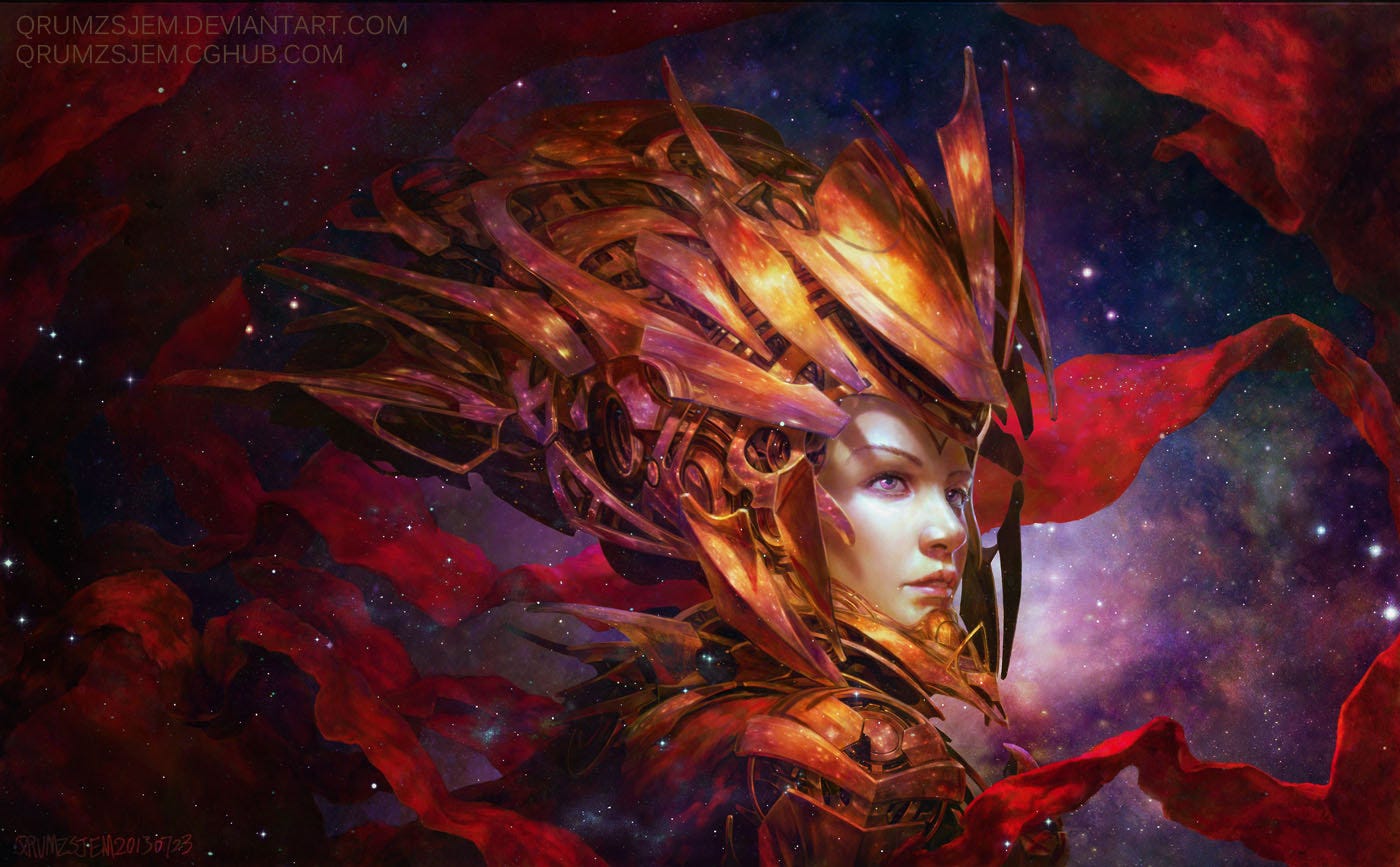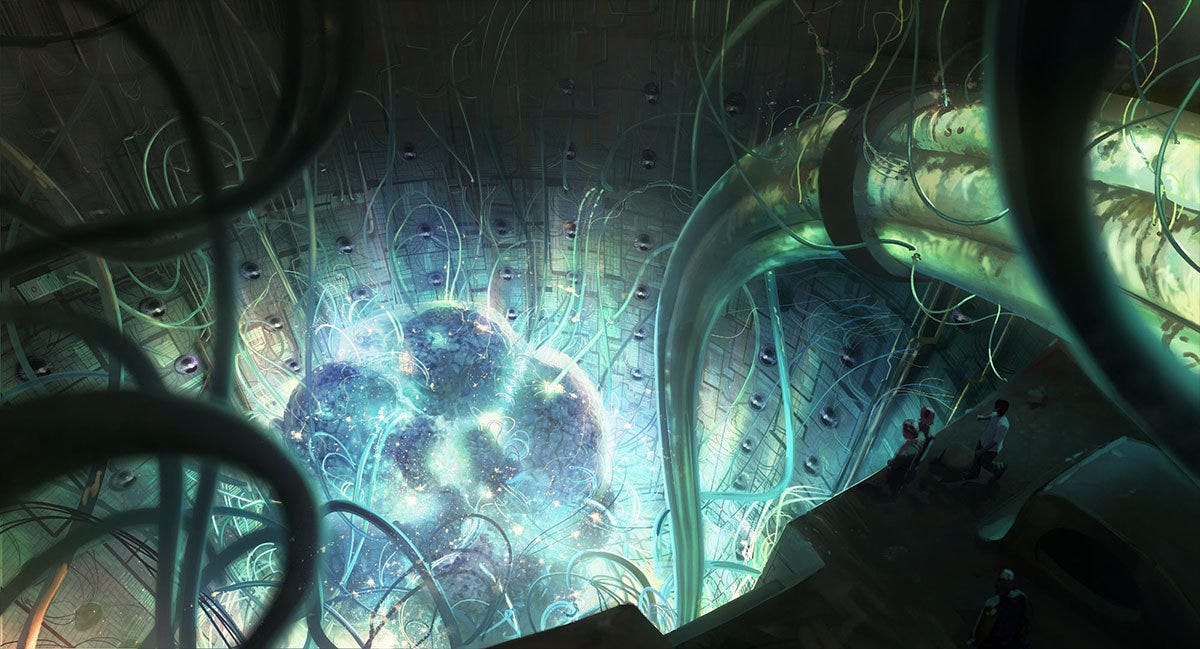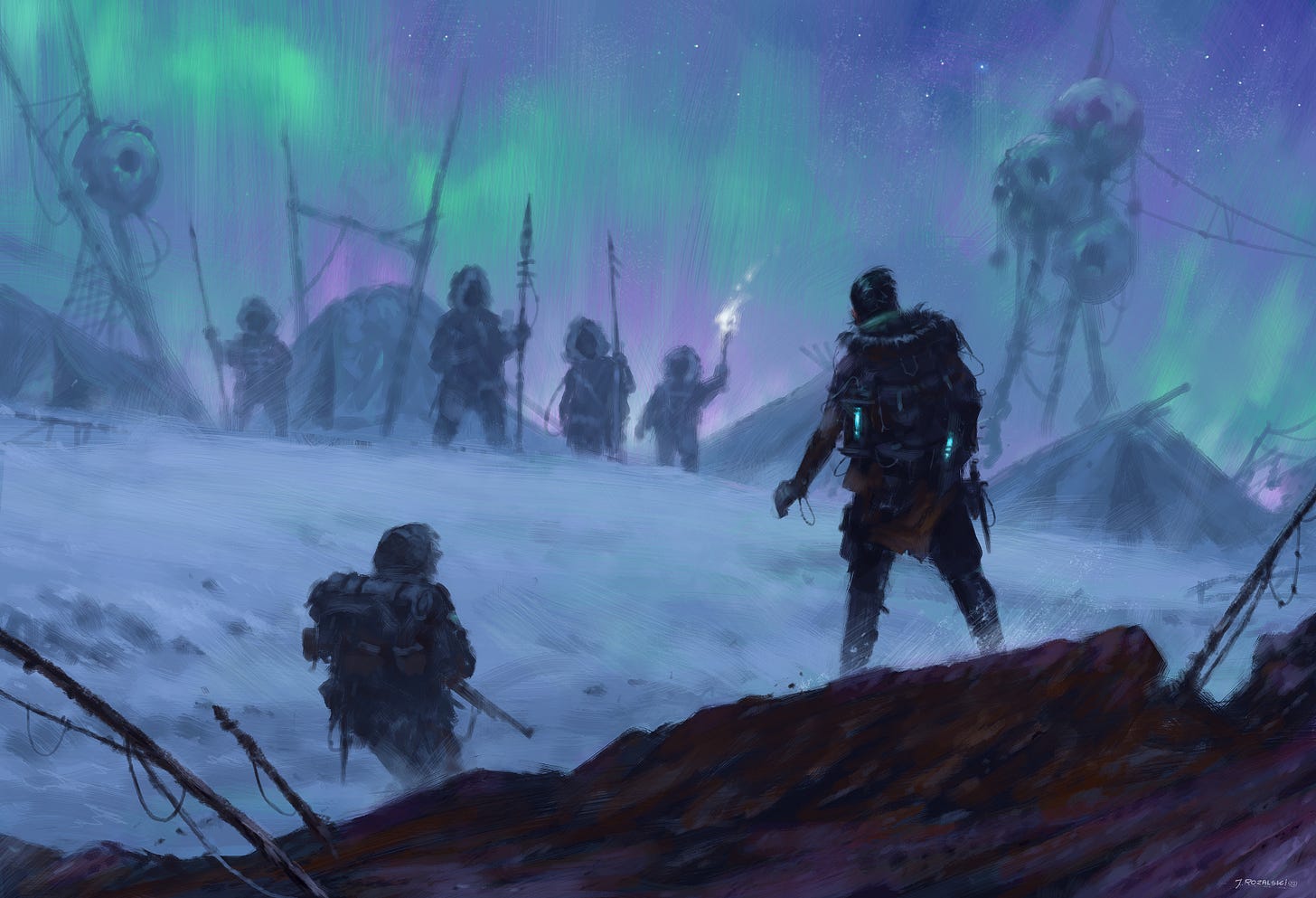Saturday Substack Digest - 29 Apr 2023
Thinking like a paranormal predator in the soul-killing Feed of Slaaneh's Longhouse
Welcome to this week’s roundup of the best of Substack. Or at least, what I thought was the best, which is more or less the same thing.
Before getting into this week’s featured Substack’s, I’d like to note that this is an auspicious week: a space probe launched by the United Arab Emirates has made the closest flyby yet of Mars’ outer moon Deimos.
Luckily, our secret base on Deimos Station was not discovered. We considered disabling the interloper with our low orbit ion cannon and claiming it as spoils of war, but decided it was better to keep a low profile.
For now.
In this second instalment of the weekly digest, we have some words on thinking like a predator; the fractality of traditionalism; the spiritual toxicity of The Feed; the quixotic quest to build an imaginary man; trickster paranormalism; a viciously delightful poem about the Internet’s favourite demoness of Slaanesh; a pocket history of the world; some words on that tricky little word ‘indigenous’; and an ethnographic expedition of the corporate Longhouse.
Last time I solicited recommendations in the comments, and they poured in. Some of those made it in; some didn’t. If your recommendations from last week didn’t make it in, do not be discouraged, because that isn’t a comment on quality, but on the fact that there are only so many hours in the day, and there are things I like to do (and have to do) that don’t involve reading Substack. Even of all the great stuff I read, there was a lot I didn’t have room to include here.
As with last week, please share your own recommendations in the comments, and if you see anything in this digest you like, don’t forget to subscribe and share the author’s work.
Without further ado, on with the digest!
I discovered
on Twitter not too long ago, and have read several of his essays with intense interest. He has written quite a bit about man's relationship with technology, or as he prefers to think of it Tekhne, a concept which is different in subtle but important ways. Mankind, in Tolma’s view as well as mine, is an obligate engineer - technology is not artificial in the sense of being unnatural, but a natural phenomenon, just as is man.Man is also an apex predator, and as Tolma explored this week in two very interesting epigrammatic essays, this has certain implications for our mode of thought and action:
The ascetic instinct is not contrary to man’s nature as a beast of prey, as a creature of action. And man’s nature as a contemplative being is certainly not an argument against man’s nature as a beast of prey.
A sheep or a cow has to eat all day, it has no time for leisure and contemplation. It has to act, constantly. It is a low level of action, however, mere chewing and small steps. It does not look far. It does not do much, yet it is condemned to constant movement. The more predatorial in nature the animal, the more intense the action becomes. A wolf, a lion, or an eagle does not graze. It seeks, it chases, it explores, and it kills with violence, all while showing miraculous insight and skill in how it goes about this. But, after the hunt is over, the lion rests for hours on end. Doing nothing, except for gazing into the distance. The more capable of intense irruptions of action, the more capable of leisure. Man is similar to the lion in this regard. He does not have to graze all day. And he does not even have to hunt every day. Which leaves more time for contemplation, and more time to think about acting in a way that surpasses the mere action required for survival. Thought and action do not exist separately. The more one is capable of thought, the more one is capable of action. And the more one is capable of action, the more one is capable of thought. At least, this is the ideal. But being man, we are already further ahead towards this ideal than the herbivore herd animal.
The Navajo spoke of looking at the world with hard eyes and soft eyes … the gaze of the predator, fixed on its prey, and the contemplative gaze that simply takes in everything without purpose or judgement, merely being with the world and with oneself. This maps neatly onto the modes of thought of the left and right hemispheres, and it seems that the apex predator can switch most dramatically between these extremes. The herbivore, on the other hand:
Instinctively, I do not look highly at the incessant low-intensity activity of the herd animal, and it is why there is something so terribly depressing about most jobs today. No deep leisure, but no intense action either. Incessant low-level activity in which neither the contemplative instinct nor the instinct for action has any release. Much more interesting and joyful is the life of the cat-like or even the lizard or the crocodile. Lying around all day, doing nothing, not out of a conscious decision to meditate or anything, but out of pure instinct, pure stillness and carelessness. And then, when the opportunity is there, fast, intense, violent action. And then back to rest, without worrying for a second about what just happened or what might happen."
While animals are locked into one or another of these modes by their biology, humans are more flexible. We can be beasts of prey, or we can be beasts of the herd….
In his second piece, Tolma expands on these ideas to consider the relationship of the mind to the body:
If we look at the smallest living organisms, micro-organisms and so on, people often say that these are living and perhaps even ‘sentient’ and even have some degree of ‘thought’, because of the seemingly intelligent way in which they can move and replicate. But their movement, and the complexity of it, is what we take as evidence of their thought. It is not that we see them thinking, that we see thinking in them as a separate thing from their movements. Their activity and their ‘thinking’ is one and the same.
Personally, I believe without hesitation that single-celled organisms are sentient beings. We’ve watched them learn, and they seem to be able to rewrite their genomes to respond to environmental conditions much faster than can be explained via natural selection and random mutation. This goes deeper, too, in my opinion - even atoms possess a sort of consciousness. Yet at that most basic level there is no distinction at all between mind and body; as evolution proceeds, and complexity increases, the differentiation of these aspects of being becomes more pronounced.
[T]he human can sit still and dream up an entirely new theory or story about whatever, its thinking can become an acting of its own, seemingly distinct from its acting with its body in space. What I want to say is, the more advanced the organism in its entirety, the more distinct the soul and the body, and the more contemplation and action come to appear as two separate things.
"‘Dualism’ is created. Now, this does not make it a ‘illusion’ or ‘fiction’ any more than a tree is a fiction because it is created out of different things which existed prior to the tree as a whole. The tree is not an illusion, whereas the soil and the seed are real. The result is a veritable creation, a thing of its own, and possibly an advancement.
This is I think an important point. Just because something is ‘created’ does not make it fake.
Of course, there are new problems that emerge as this differentiation proceeds:
Does Nature have organisms evolve so that soul can finally be freed from body? So that contemplation can come to stand on its own, no longer being attached to action? Perhaps. But again, without action, no contemplation. And if contemplation could come to rule by itself, it can happen that it slowly starts devouring the contemplator.
But as Tolma notes, we are faced with the problems that we have the strength to solve.
He’s been writing much longer than Substack has been around, and as his content is the furthest thing from ephemeral he’s been necroposting some of his older essays, which remain as relevant and interesting now as when they were fresh.
A case in point:
It is helpful to think of tradition from an energy state perspective. Thought of this way, we can recognize traditionalism as a low-energy state, one which is characterized by high levels of social stability and order, which are able to “sink” social energy, preventing it from overflowing into destructive channels. Conversely, modernism is correctly described as a high-energy state system demonstrating instability and perturbed order.
I’ve used the same metaphor, myself - modern society as a sort of high-energy plasma in which bonds are incredibly difficult to form, as compared to traditional society as a sort of solid in which bonds are the norm.
Now let’s add a little far-from-equilibrium thermodynamics:
Human societies are extremely complex phenomena – “culture” goes far deeper than the relatively superficial externals of food, clothing, language, public rituals, etc. which outsiders to a culture typically observe. Due to their complexity, we should understand human societies within the framework of “complex adaptive systems” (CAS), which have been defined as “dynamic, non-linear systems that are not in equilibrium and do not act predictably.” Both of these conditions are important, but the fact that they are not in equilibrium is more relevant to my immediate point.
On Traditionalism:
In many dissident Right circles, Evola is often discussed as an articulator of “big-T” Tradition. While many of his criticisms of Christianity were childish, he nevertheless did have some important and useful things to say with respect to defining Tradition vis-à-vis modernism. Indeed, the multifarious “small-t” traditionalisms are, in many ways, distillations and adaptations of Tradition, utilizing its concepts (see table below) while varying in the specifics.
And in terms of chaos mathematics:
Human societies seem to exist around and circle a strange attractor representing Tradition. While they never do quite reach the basin of “pure” Traditionalism, they nevertheless tend to fall back into the orbit of the attractor’s basin after their periodic bouts with modernism. (Please note that my references to concepts from chaos/complexity theory are not meant to be mathematically rigorous, but are being used analogically.) This attractor is “strange” because it seems to display fractal behavior whereby iterations upon iterations of the society’s activities each day, each year, each lifetime and generation map out a complex path tending toward the attractor basin, except when grossly perturbed by the introduction of modernistic tendencies.
Chilton argues that ‘modernism’ in the sense of an anti-traditional, high-energy system that kicks a human society out of its low-energy state and thereby dissolve the previous forms, is not actually ‘modern’ in any sort of narrowly temporal sense, but is something we’ve seen many times before, e.g. in the Roman republic. Seen in this fashion, the progressive view of history becomes simply the latest climb up the mountain; inevitably, we’ll come down into another valley … but it won’t be the same valley as before.
I thoroughly enjoyed this savage little essay by
, and if it doesn't make you immediately subscribe and then put down the damn phone that you’re reading this on and go do something, anything else with your time, I don’t know what will.Emily’s concern here is the way that the constant nagging of the algorithm won’t give our minds a moment’s peace:
Because our Twitter-brains demand instant gratification, we’re finding it increasingly difficult to create, to produce, since creativity relies on a quiet, open mind and feet that have recently touched grass. Not to mention, it generally takes a lot of time. So instead, we turn the channel to static and let it hiss.
Only 80s kids who remember life before Netflix will get that reference to hissing static. Which is a shame because it describes Algo-Brain incredibly well. But it isn’t just the emptiness of the time that disappears into the Skinnberbox:
The Doom-Spiral is what happens when, in an attempt to occupy one’s mind or, as we sometimes cleverly put it: “find creative input,” one turns not to a book, not to music, and certainly not (God forbid!) to the great outdoors or a blank, silent page, but to The Feed.
The never-ending scroll of the Feed, annihilating memory and thought with its constant tiny bursts of attention. Have you ever paid attention to your mind feels after an hour scrolling through the Feed on your phone? It’s like the higher functions shut down completely. Ot’s completely different to what happens when you’re immersed in a book.
Emily captured perfectly my love-hate relationship with the black mirror ... an addictive electronic metacortex that renders me both superhumanly intelligent (because I can know anything I want, instantly) and subhumanly stupid. Instant access to everything from The Feed becoming the relentless hum of the hive, drowning out the quiet space inside one’s soul from which creation springs.
If Emily is a bit skeptical of the effects of technology, my fellow Deimos Station proprietor
is an committed Butlerian jihadist ... at least where the subject of artificial intelligence comes up. He's also, frankly, one of the absolute best writers on this platform, and you should subscribe to him just to bask in his sumptuous prose.This week he took a poke at someone suggesting that what we really need is regulation of AI in order to compete with our Sinic overlords:
The problem? China, of course. China might beat us in the race to waste precious time and money and intellectual resources on building an imaginary man. His solution is to empower a U.S. Bureau of AI to punish companies when their LLMs tell a fib, in the hopes that this will spur innovation.
I LOL’d at ‘imaginary man’.
As Mark points out, if you have a regulatory body demanding that LLMs only tell True Things, that implies Official Truths. We all know where that leads. But that isn’t his main issue:
Many of the people writing about and working on AGI don’t seem to know what their success will look like either. If and when they make such absurd claims, it will register to the rest of us as a form of manic pareidolia. That’s because the crowd who demands progress on such fantasy AI projects strongly believes in magic while pretending to be science nerds. In fact, they will adamantly protest the notion they’re engaging in woo of any kind, beat their chests and proclaim themselves more rational than Spock’s dad, insist that they’ve unlocked the secrets of the human mind, when we have yet to unlock the secrets of a rat’s.
For that matter, we have no real idea how a cell thinks. As cells most certainly do.
Of course, much of this comes down to the hard problem of consciousness … with those who think they can make a conscious robot either believing that consciousness somehow ‘emerges’ from matter, or that it doesn’t really exist at all. This is felt to be somehow scientific, and yet:
Well allow me to retort.
You can’t prove success. Ever.
AGI is unfalsifiable, because consciousness itself is. You cannot prove you are a conscious being, and neither can I. These are articles of faith. Perhaps you should consider what kind of religion you’re promoting, when you point at a box of wires and call it conscious.
Techno-Shintoism, perhaps?
The point, however, is a very good one. Consciousness isn’t something that can be proven. Except maybe internally, and even then I suspect that one could think oneself into believing one’s own consciousness is an illusion (although if so, who precisely is having that illusion?) The consciousness of another, however, can’t be proven … someone could after all be merely mimicking consciousness. Maybe everyone. That’s an absurd reductio if ever there was one, but ultimately one must take the existence of consciousness on faith. Whether one lives in a dead world or a living one is a choice.
Here’s a little known fact: the majority of people in the US and the UK believe in some form of paranormal reality or phenomena—quite independently of their educational backgrounds or whether they believe in God.
It’s a very strange thing, is it not, that so many people have directly experienced, or know someone they trust who has experienced, phenomena such as Near-Death Experiences, ghosts, telepathy, premonitions, and all the rest of the weird world of woo … and yet, despite this, we all spend our waking lives participating in an official reality in which none of these phenomena are real.
It isn’t only backwoods hicks and crystal mommies who think this way:
[I]f most people across education levels think the paranormal is real, why has “official academia” always been so incredibly hostile towards it? Mind you, many (if not most) important individual scientists and academics were interested in these things and even thought they were real; it’s official science that has been at war with anybody looking into it for a long time.
It’s almost as though officialdom instinctively recognises that the paranormal must be suppressed. Perhaps this relates in some way to something intrinsic to the paranormal itself, something which makes it somehow dangerous?
In his book, The Trickster and the Paranormal, George P. Hansen shows the many similarities between the Trickster archetype and paranormal phenomena. The book is partly a warning, directed at naive researchers, that the paranormal is not just like any other thing one might study. We are dealing with forces here that don’t quite fit into our reality, including our ideas about science, logic, causality, and so on.
The anthropology of the paranormal is interesting, as well. We consider belief in the paranormal to be a marker of primitivism, and there’s a tendency for more complex societies to treat those who engage with it directly as low status:
What’s more, it seems that a highly structured modern society is intrinsically hostile toward direct contact with the supernatural. Famous sociologist Max Weber had already thought along those lines, and Michael Winkelman came up with his own theory based on anthropological research. Basically, the more complex and bureaucratic a society becomes, the less status those who deal directly with the higher realms enjoy.
It’s worth pointing out that while traditional Christianity certainly believes in the paranormal, it also advises strongly against having anything to do with it. Perhaps this is because the spiritual energies that can be unleashed when the paranormal becomes psychologically active are too destructive for a highly structured society to survive….
Cat Girl
is another Substacker I found via Twitter, where she has a huge following. She tends to write extremely long essays doing deep dives into pop culture phenomena. I thoroughly enjoyed her treatment of Cyberpunk - not the video game, and not the genre, but the tabletop RPG I fell in love with as a kid back in the 80s.This week, however, she flexed her poetic side, offering up some cheeky verses about Twitter’s favourite data scientrix and professional demoness of Slaanesh, Aella. Here’s a taste:
My Dears!? You rise as if in rage.
Please-please return! Don't close the page.
Back to my breast, my warm embrace.
1 to 5, how hot's mixed race?
And if a prize you could have won,
The joyless 9, or lusty 1.
Would you impose upon true grace?
Or gorge yourself? ignore her face.
My dearest ones I need to know!
All that lustful love might sow.
If you'd see my legs apart,
then show me first your shameful heart!
And if my 10 you might just claim,
but cruel barb, upset your aim...
Would you have me 12 years young?
Or would you have me 91?
The whole thing is quite brilliant.
In the beginning, God created the heavens and the earth. But they were formless and void, so he carried on until they weren’t. After a week of fashioning odd little things like dung beetles and duck-billed platypuses, he decided to make an even odder creature. “Let us make man,” he said. And he did, right before quittin’ time. “And evening and morning were the sixth day.” Then the Lord made him a wife. It was all pretty much downhill after that.
Is he a young Earth creationist? Is it a joke? Who cares? All sins are forgiven for a paragraph that ends with casual misogyny.
Moving on….
The Egyptians started stacking stones on top of one another and slathering mud between them just so they would have a nice place to live when they died. Incidentally, this is also when Jews developed a penchant for investment banking as opposed to, say, masonry.
Joseph comes into Egypt, Pharaoh puts him in charge of the grain supply, Joseph invites his tribe to follow him, and a couple generations later we’ve got ourselves a madcap chariot race. Total coincidence.
Around the same time, came the ancient Greeks. They were followed by more Greeks, though not quite as ancient as the earlier set. While it is true that they built some beautiful columns, they are most remembered for inventing philosophy, homosexuality, and yogurt. They are also culpable for saddling the rest of us with things like drama students and a very long poem that doesn’t even rhyme."
How dare he insult the Iliad. We shall meet at the temple of Apollo with our drawn xiphoi as the golden chariot of Helios ascends the Eastern peaks!
This week, however, he gave us something more of an op-ed pointing to an earlier essay he wrote, on the subject of that curious title ‘indigenous’ that’s cropped up all over the place lately. On the face of it, it just means ‘the original people to have inhabited a place’, but that is not at all how it’s used. Consider what happens when Europeans try to apply it to themselves:
Almost every day on Twitter, and elsewhere, the tedious conversation about British demographics and indigeneity goes back and forth without any breakthrough. The oft-repeated claim by the British liberal-left is that Britain does not have any indigenous people, therefore nobody can be upset by immigration levels or changing populations within major cities.
The crucial aspect seems to be power relations:
It has become crucial for the definition of indigenous that these people remain powerless and dependent on a technocratic body like the UN to arbitrate and mediate on their behalf.
If you think carefully about it’s surface meaning, it’s actually a pretty content-free word:
What qualifies as indigenous? If its a question of ‘first-come, first-served’, then practically nobody on earth comes out with clean hands, if its a case of chronology then many ‘indigenous’ nations have been around for far less time than the English or French. When it comes down to it, there is no good criteria for indigenous other than the ridiculous and contradictory definition of ‘pre-colonial’ societies. Ultimately, as I argue in the article, majority populations shouldn’t need to beg for their existence, their nations and lands belong to them through conquest, defence, pride, love and kinship.
It's striking how the concept of indigenous maps almost perfectly onto the categories that would previously have been referred to as savage or primitive. It isn't quite perfect, because while the specific ethne falling under those categories are essentially the same, the implicit characterization could not be more different. 'Indigenous' denotes a powerless supplicant group who are to be treated as mascots and clients of the liberal state; 'savage' implies an untamed and untameable wildness fully outside of the influence of the state. It is the difference between the unconquered and the subjugated.
Personally, I’d rather be a savage than ‘indigenous’.
We end this week’s digest with a guest post by
, who doesn't appear to have written anything else on Substack yet and who I certainly hope does.Galutha spent several years working in corporate America, in an industry that’s majority - something like 80% - female, with much of that time being subjected to an org chart that was women almost all the way up. He was, in other words, in the very bowels of the Longhouse, and having escaped this purdah he has composed for us an ethnography.
What’s it like to work in the Longhouse? It’s very … quiet … quiet as a whisper….
With everything known and knowable, transparent as the glass walls of every conference room, all knowledge clearly sorted and available for reference in the labyrinths of a pathologically organized Google Drive, women maintain control of the modern workspace. They hold a secret power that self-respecting men do not possess: the whisper. Years have elapsed where I have not whispered, but Woman knows its power. It is the soft pleasant murmur of the four-legged snake to Eve and of Eve back to the four-legged snake.
Not a lot gets done, of course. Everything revolves around snacks.
Things continued in this way, days of endless chatter punctuated by organized periods of snacking and eating. Days were structured around munching. I watched with a coffee, intermittently fasting, as they had their daily “Harvest Snaps break.” They gathered in a room designated for office supplies, each removing a single serving bag of vegetable crisps. Later the same day it might be “puffy chips'' time, or “seaweed snack” time, or whichever treat happened to be in stock and in vogue. A cattle call formed every day when lunch arrived, and people avoided a good half hour of work standing and chatting with paper plate and utensils in hand for the catered lunch. If they just staggered their self-service, they could have avoided the wait, but that would mean more pretend work. After lunch there were daily group walks, pairing off to nearby coffee shops to buy milky sugary dessert drinks.
Then of course there is the love of procedure.
She introduced me to the SaaS platform, demonstrated which boxes I needed to check off as I completed my tasks, explained how to log my time and hours to those individual tasks and projects, and how to input all of the data that would show someone else I had done my job, as each of a myriad of campaign microtasks were completed. It was for my own good, it was explained, so that they didn’t give me too much work.
Thus began the tyranny of the checkboxes. As the company grew and hired more management and administrative staff, each group brought its own expansions to Salesforce, new procedures for a myriad of SaaS platforms, additional layers of checkboxes that needed to be clicked to signal that we had done the work, because how could one know through performance alone."
Galutha identifies a particular kind of girlboss, whom he terms the dread woman. I think we all know this archetype:
These masculine “dread women” are the greatest enforcers of the new work regime, and quickly fill the bulk of mid-management roles because of their callousness. They are universally mid-thirties. If their masculinity seeps into their physical form, they are single. If they are still physically thin and feminine they will be engaged to an effeminate type of man for a long period of time and then probably unhappily marry him. If he is wealthy enough, she will generally have a baby and quit as soon as she can. If not, she will grow in her masculine frame and solidify her territory in the company. This type of dread woman makes the company her family.
There's another type of management clone that I've noticed - male, but barely, probably not gay but can be mistaken for it, always speaking with a distinctive, soft, passive-aggressive uptalk. This seems to me the mirror image of the Dread Woman den mother he describes. A self-castrated man perfectly adapted to the digital Longhouse.
The essay is both entertaining and insightful, and very strongly recommended.
That’s everything for this week. As always, “Don’t forget to like and subscribe!”, and leave any recommendations in the comments!
If you’re already a paid supporter of Postcards From Barsoom, you have my deepest and most heartfelt gratitude. While everything on Postcards From Barsoom is provided free for all to read and respond to, your support makes my writing possible. If you enjoyed this essay, or you’ve enjoyed previous essays, and you have the resources to do so, please consider upgrading to a paid subscription. If you take out a paid sub, you might even develop superpowers. What is certain, however, is that a paid sub gets you in to Deimos Station.






















I spent a good amount of time in rural Transylvania collecting folklore stories. These were stories mostly of people’s personal experiences but some which were heresay and clearly conformed to known motifs in the ethnological accounts.
I would return to a university city, Cluj, after expeditions in the hinterland. At bars when I told younger people what I was doing most would say something to the effect of “that’s just country people superstitions” then proceed to tell me I should really be going to collect stories of UFO phenomenon in a nearby forest.
Asking them to explain, often they would describe a UFO story that shared many aspects of the folk stories I found in the countryside but more boring and less rich. More unbelievable in some ways.
It was clear to me that the stories were similar, but one set of stories had more validity to younger people who wanting to separate themselves and attain status could only tell the story using UFOs as the “entity” that was unexplained.
Ah, the paranormal. Finally we get to a topic on which I can comment from actual experience. I've had several, in fact, experiences of precognition. If anyone's interested I'll expand on them.
On other topics: We don't know what goes on in the minds of grazing animals, or of predators, and though I'm naturally drawn to admiration of the skill and cunning by which a predator must take down its meal, I'm not scornful of the other kind. Their thoughts and ways are their own and just because they may lack the terrible and elegant beauty of creatures like cats and wolves, a lot may still be going on inside.